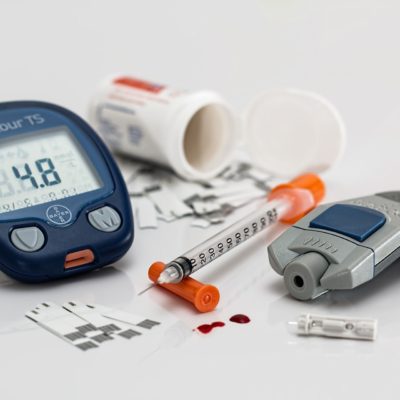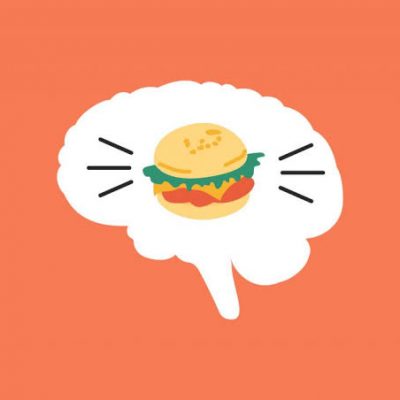Establishing a consistent sleep schedule for a toddler can be one of the most challenging aspects of child rearing, but it also may be one of the most important. Research findings from a team including Lauren Covington, an assistant professor in the University of Delaware School of Nursing, suggest that children with inconsistent sleep schedules have higher body mass index … [Read more...]
Weight Management

Deciphering the genetics behind eating disorders
Anorexia nervosa, bulimia nervosa and binge-eating disorder are the three main eating disorders that 4 out of in 10 individuals living in Western Europe will experience at some point in their lives. In recent years, studies on the genetic basis of anorexia nervosa have highlighted the existence of predisposing genetic markers, which are shared with other psychiatric … [Read more...]
Survival tip: Start at normal weight and slowly add pounds
People who start adulthood with a body mass index (BMI) in the normal range and move later in life to being overweight -- but never obese -- tend to live the longest, a new study suggests. Adults in this category lived longer than even those whose BMI stayed in the normal range throughout their life. Those who started adulthood as obese and continued to add weight had the … [Read more...]
Danish and Chinese tongue taste broccoli and chocolate differently
Two studies from the University of Copenhagen show that Danes aren't quite as good as Chinese at discerning bitter tastes. The research suggests that this is related to anatomical differences upon the tongue of Danish and Chinese people. For several years, researchers have known that women are generally better than men at tasting bitter flavours. Now, research from the … [Read more...]
Dieting and weight worries on rise in Teenagers
Significantly higher numbers of Generation Z boys and girls in the UK are dieting to lose weight, and are likely to overestimate their own weight, finds a new UCL-led study. The research, published in JAMA Pediatrics, found that girls who are trying to lose weight are also more likely to experience depressive symptoms than in previous years. In 2015, 42% of 14-year-old … [Read more...]
Genetic differences in body fat shape men and women’s health risks
New research is revealing how genetic differences in the fat in men's and women's bodies affect the diseases each sex is likely to get. University of Virginia researchers Mete Civelek, PhD, Warren Anderson, PhD, and their collaborators have determined that differences in fat storage and formation in men and women strongly affect the activity of 162 different genes found in … [Read more...]
Gen Z not ready to eat lab-grown meat
New research by the University of Sydney and Curtin University to published on 8 September in Frontiers in Nutrition, found that, despite having a great concern for the environment and animal welfare, 72 percent of Generation Z were not ready to accept cultured meat -- defined in the survey as a lab-grown meat alternative produced by in-vitro cell cultures of animal cells, … [Read more...]
Obesity not related to how close you live to fast food or gyms
A new study from Lund University in Sweden has shown no correlation between obesity and how close you live to fast food restaurants or gyms. Studies from other countries have previously indicated that these factors may be important in adult obesity. The areas where we live are known to be important for our health. For example, obesity is more prevalent in deprived … [Read more...]
Coffee linked to lower body fat in women
Women who drink two or three cups of coffee a day have been found to have lower total body and abdominal fat than those who drink less, according to a new study published in The Journal of Nutrition. Researchers examined data from the National Health and Nutrition Examination Survey, organised by the Center for Disease Control (CDC) in the United States and looked at the … [Read more...]
An obesity protein discovery may lead to better treatments
A USC-led international team of scientists has found the precise shape of a key player in human metabolism, which could lead the way to better treatments for obesity and other metabolic disease. For the study, the scientists focused on a protein in the brain, the melanocortin 4 receptor (or MC4R). This receptor helps with regulating the body's energy balance by controlling … [Read more...]
A gut-to-brain circuit drives sugar preference and may explain sugar cravings
A little extra sugar can make us crave just about anything, from cookies to condiments to coffee smothered in whipped cream. But its sweetness doesn't fully explain our desire. Instead, new research shows this magic molecule has a back channel to the brain. Like other sweet-tasting things, sugar triggers specialized taste buds on the tongue. But it also switches on an … [Read more...]
Obesity is a critical risk factor for type 2 diabetes, regardless of genetics
Obesity increases the risk of developing type 2 diabetes by at least 6 times, regardless of genetic predisposition to the disease, concludes research published in Diabetologia (the journal of the European Association for the Study of Diabetes [EASD]). The study is by Dr Theresia Schnurr and Hermina Jakupovi?, Novo Nordisk Foundation Center for Basic Metabolic Research, Faculty … [Read more...]
Newly discovered brain response to obesity drug may inform future treatments
The U.S. Food and Drug Administration-approved drug liraglutide has been shown to help obese patients lose weight by suppressing their appetite. However, where and how the drug acts in the brain was not fully understood, until now. A new preclinical study from the Perelman School of Medicine at the University of Pennsylvania, published in Science Translational Medicine today, … [Read more...]
Neuron Found in Mice Could Have Implications for Effective Diet Drugs
Ever eaten something, gotten sick and then didn't want to eat that food again because of how it made you feel? That's because a signal from the gut to the brain produced that sickness, creating a taste aversion. Conventional wisdom renders there's one circuit in the brain that suppresses eating -- it comes from the stomach and makes you feel sick if you activate it too hard. … [Read more...]
Intermittent fasting: Live ‘fast,’ live longer?
For many people, the New Year is a time to adopt new habits as a renewed commitment to personal health. Newly enthusiastic fitness buffs pack into gyms and grocery stores are filled with shoppers eager to try out new diets. But, does scientific evidence support the claims made for these diets? In a review article published in the Dec. 26 issue of The New England Journal … [Read more...]
Why you should consider ‘exercise snacks’ and just moving more in 2020
If you want to get in better shape in 2020 you don't necessarily have to achieve it through long, arduous workouts according to researchers at the University of B.C. This past year, Jonathan Little, who teaches at the school of health and exercise science at UBC Okanagan, published two studies that showed the benefit of what he calls "exercise snacks." They are 20-second … [Read more...]
Type 2 diabetes remission possible with ‘achievable’ weight loss
People who achieve weight loss of 10% or more in the first five years following diagnosis with type 2 diabetes have the greatest chance of seeing their disease go into remission, according to a study led by the University of Cambridge. The findings suggest that it is possible to recover from the disease without intensive lifestyle interventions or extreme calorie … [Read more...]
Eat This, Not That: Avoiding Holiday Weight Gain
ORLANDO (Ivanhoe Newswire) --It’s easy to gain weight during the holidays, especially with all the dinners and parties and mindless eating they bring. In fact, half the weight we gain all year comes during the weeks leading up to the new year. We have the skinny on what to eat and how to keep the pounds away this holiday season. We all have our holiday favorites, but … [Read more...]
Brown and white body fat speak different languages
Many people might not realize that they have different types of body fat. Most of it is white fat that sits on your stomach, hips and thighs, for example. White fat is an energy storage that our body can use when food is scarce. White fat also produces and receives signals from a variety of different hormones, such as adrenalin and insulin. Brown fat is very different. It … [Read more...]
Behavioral, biological similarities between compulsive overeating and addiction
According to Boston University School of Medicine (BUSM) researchers the chronic cyclic pattern of overeating followed by undereating, reduces the brain's ability to feel reward and may drive compulsive eating. This finding suggests that future research into treatment of compulsive eating behavior should focus on rebalancing the mesolimbic dopamine system -- the part of the … [Read more...]
Factors that determine obesity by adolescence revealed
Three simple factors that predict whether a healthy weight child will be overweight or obese by adolescence have been revealed in a new study led by the Murdoch Children's Research Institute (MCRI). The research shows three factors -- a child's and mother's Body Mass Index (BMI) and the mother's education level -- predict the onset or resolution of weight problems by … [Read more...]
Molecule links weight gain to gut bacteria
UT Southwestern researchers have found a key driver of the crosstalk that helps synchronize the absorption of nutrients in the gut with the rhythms of the Earth's day-night light cycle. Their findings could have far-ranging implications for obesity in affluent countries and malnutrition in impoverished countries. In the study, published this week by Science, Dr. Lora Hooper … [Read more...]
Obese people outnumber smokers
New figures from Cancer Research UK show that people who are obese now outnumber people who smoke two to one in the UK*, and excess weight causes more cases of certain cancers than smoking, as the charity urges Government action to tackle obesity. Almost a third of UK adults are obese** and, while smoking is still the nation's biggest preventable cause of cancer and carries … [Read more...]
Intermittent fasting reduces pancreatic fat
Intermittent fasting is known to improve sensitivity to the blood glucose-lowering hormone insulin and to protect against fatty liver. DZD scientists from DIfE have now discovered that mice on an intermittent fasting regimen also exhibited lower pancreatic fat. In their current study published in the journal Metabolism, the researchers showed the mechanism by which pancreatic … [Read more...]
Doctor calls for Ireland to fight child obesity by leading the way on plain packaging for sweets
The HSE’s clinical lead on obesity, Dr Donal O’Shea has said Ireland should lead the way on fighting childhood obesity by introducing a plan packaging policy on fizzy drinks and sweets. Ireland had already led the way in relation to the smoking ban and there should be a similar campaign to introduce plan packaging on unhealthy foods, he said. He was speaking after Public … [Read more...]
Fat cell discovery could help combat obesity-related health issues
Researchers have discovered differences in fat cells that could potentially identify people predisposed to metabolic diseases such as diabetes and fatty liver disease. The world-first discovery also identified 'fast burning' fat cells that if unlocked might help people lose weight. About 70 per cent of Australians are overweight or obese, which has been linked to metabolic … [Read more...]
With abdominal etching, plastic surgeons help patients get ‘six-pack abs’
Even with a good diet and workout routine, some men and women have trouble getting the toned abdominal appearance they want. For these patients, a technique called abdominal etching can help in creating the classic "six-pack abs" physique in men or three-vertical-line abdomen in women, reports a study in the April issue of Plastic and Reconstructive Surgery®, the official … [Read more...]
Children Exposed to Air Pollution at School may be at Greater risk of Overweight and Obesity
Exposure to air pollution, particularly at school, could be associated with a higher risk of overweight and obesity during childhood. This is the conclusion of a study by the Barcelona Institute for Global Health (ISGlobal), an institution supported by "la Caixa," performed with 2,660 children between 7 and 10 years of age from 39 schools in Barcelona. A few studies have … [Read more...]
Identity Crisis of Satiety Neurons Leads to Obesity
Obesity -- as research in the past decade has shown -- is first and foremost a brain disease. Researchers at Helmholtz Zentrum München, partners in the German Center for Diabetes Research, have now discovered a molecular switch that controls the function of satiety neurons and therefore body weight. The findings were published in the journal Nature Metabolism. The worldwide … [Read more...]
How exercise reduces belly fat in humans
Some of you may have made a New Year's resolution to hit the gym to tackle that annoying belly fat. But have you ever wondered how physical activity produces this desired effect? A signaling molecule called interleukin-6 plays a critical role in this process, researchers report December 27 in the journal Cell Metabolism. As expected, a 12-week intervention consisting of … [Read more...]
- « Previous Page
- 1
- 2
- 3
- 4
- 5
- …
- 28
- Next Page »





























